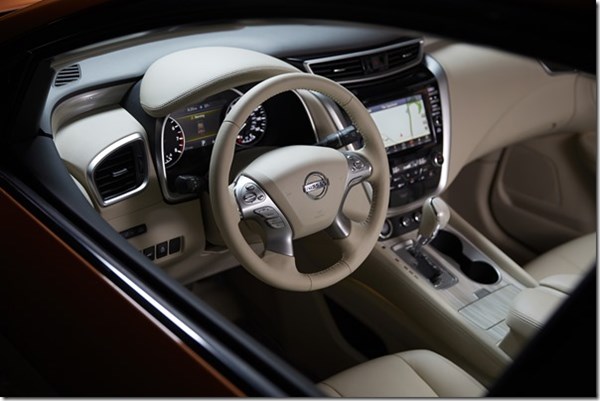How the 2015 Nissan Murano Was Developed
One of the best stories you’re ever likely to hear about automotive development comes from Chris Reed, overseas chief engineer for the 2015 Nissan Murano, the all-new third-generation vehicle. (He was the straight-up chief engineer for the crossover when he lived in Japan, but now that he is back at the Nissan Technical Center in Farmington Hills, Michigan, the word “overseas” is appended.) Clearly, of all crossovers on the market, the Murano, since it made its debut in 2002 as a 2003 model, has had a far more expressive design, one with shapes and forms that are more characteristics of a sports car than a sport-ute.
#interior #electronics
One of the best stories you’re ever likely to hear about automotive development comes from Chris Reed, overseas chief engineer for the 2015 Nissan Murano, the all-new third-generation vehicle. (He was the straight-up chief engineer for the crossover when he lived in Japan, but now that he is back at the Nissan Technical Center in Farmington Hills, Michigan, the word “overseas” is appended.)

Clearly, of all crossovers on the market, the Murano, since it made its debut in 2002 as a 2003 model, has had a far more expressive design, one with shapes and forms that are more characteristics of a sports car than a sport-ute.
But, Reed relates, as time has gone on, the competitors’ products have become more expressive, so for the 2015, they had to reestablish distinction in design.
(Realize that Reed is an engineer, not a stylist, and he is acutely concerned with making sure that shapes and forms, both outside the car and in, are executed even though there might be more easily achieved alternatives.)

Three days before the decision was going to be made for the production version of the car, after they had winnowed away many alternative designs that had been presented by studios in Japan, Europe and the U.S., they were down to two vehicles.
One of the two, Reed says, was the most likely to succeed.
But he, and some of his colleagues, realized that the other one was more expressive. Had much more gesture. Flair. A certain something. But it would be more difficult to produce.
Still, they knew that that had to be the one, so they spent the time before the die was cast to figure out whether they could do it.
And that’s the vehicle that is the one that they’re manufacturing in a plant in Canton, Mississippi.
Reed talks about that aspect of the Murano, as well as the “zero-gravity” seats, how they achieve a remarkable coefficient of drag of just 0.31 and much more on this edition of “Autoline After Hours.”

QUANT e-Sportlimousine with nanoFlowcell (no, we don’t get it, either)
In addition to which, John McElroy of “Autoline,” Joann Mueller of Forbes and I discuss other recent automotive topics, including some of the products introduced at the Chicago Auto Show; Harry J. Wilson, who is nominating himself for a spot on the General Motors Board of Directors; and alternative propulsion sources, including some mysterious electrolytic fluid.
All of which you can see here:
RELATED CONTENT
-
Mustang Changes for 2018
On Tuesday Ford unveiled—using the social media channels of actor Dwayne Johnson (this has got to unnerve some of the auto buff book editors)—the 2018 Mustang, which has undergone some modifications: under the hood (the 3.7-liter V6 is giving way to a 2.3-liter EcoBoost four, and a 10-speed automatic is available), on the dash (a 12-inch, all-digital LCD screen is available for the dashboard), at the tires (12 wheel choices), on the chassis (MagneRide damper technology is being offered with the Mustang Performance Package), and on the exterior (three new paint colors). And while on the subject of the exterior, there are some notable changes—a lower, remodeled hood, repositioned hood vents, new upper and lower front grilles, LED front lights, revised LED taillamps, new rear bumper and fascia.
-
The Genovation GXE: >220 mph and Street Legal
A 2019 Corvette Grand Sport has a starting price on the order of $66,950. The Genovation GXE, which is predicated on the Corvette Grand Sport, will set you back some $750,000.
-
Ford Copies Nature
As Nature (yes, capital N Nature) has done a pretty good job of designing things, it is somewhat surprising that Man (ditto) doesn’t follow Nature’s lead more often when it comes to designing objects.


.jpg;width=70;height=70;mode=crop)